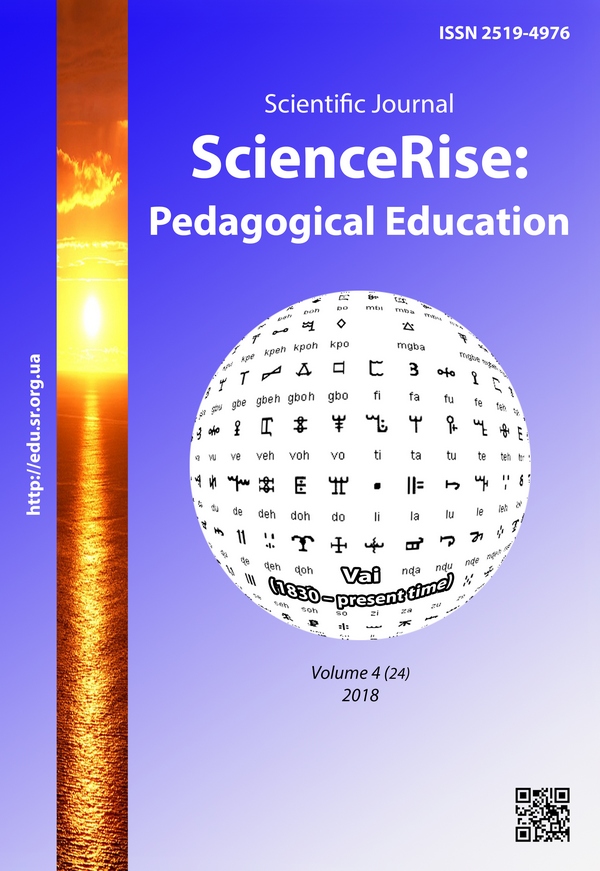Methodology for determining the effectiveness of electronic educational resources for the system of postgraduate education of teachers
DOI:
https://doi.org/10.15587/2519-4984.2018.132332Keywords:
postgraduate education of teachers, electronic educational resources, model of integral assessmentAbstract
The article examines the criteria for determining the effectiveness of electronic educational resources for the system of postgraduate teacher education. One of the components of the educational process in modern pedagogy is the open educational resources used to provide educational and educational process. Therefore, the task of efficient use of open electronic educational resources becomes relevant.
Relying on the analysis of scientific sources, world and domestic experience in assessing the quality of electronic resources, a model of integrated assessment of the qualities of electronic educational resources is developed, which provides an assessment of the qualities of each individual training module.
Important elements of the integral assessment of the qualities of an electronic training module at each procedural stage are the order and evaluation criteria. Integrated assessment of the quality of electronic educational resources contains the components:
– Innovation, including interactivity, multimedia, modifications, cross-platform;
– Technological, including volume, architecture, functionality, multimedia components, manifest and metadata of the electronic educational resource;
– Content that includes compliance with the modern scientific phenomenon of the subject area, the correspondence of educational content to educational standards and the training program, exhaustive representation of the thematic element, compliance with the basic values of the society, and the correspondence of the resulting data of the modern electronic educational resource.
The developed methodology for evaluating the effectiveness of electronic educational resources in the system of postgraduate teacher education provides an integrated assessment of the quality of each individual training module. Such an assessment system contains such parameters that characterize the innovative, technological and contental qualities of the training module. Such a system of evaluation of electronic educational resources allows:
– to evaluate and monitor both individual training modules and the whole educational system as a whole;
– to move from the assessment of individual processes and elements in the training module, to the modular structural and target oriented personality of a specialist, studying in the system of postgraduate education;
– to introduce a system of integral assessment of the quality of educational resources and the efficiency of the consumer's activity of educational services. The convenience of integral assessments is that they provide a unique numerical quality criterion
References
- Bykov, V. Yu., Lapinskyi, V. V. (2012). Methodological and methodical bases for the creation and use of electronic teaching aids. Computer at school and family, 2 (98), 3–6.
- Vember, V. P. (2007). Informatization of education and the problems of introducing pedagogical software tools into the educational process. Information technologies and teaching aids, 2 (3). Available at: http://elibrary.kubg.edu.ua/859/
- On Approval of the Provision on Electronic Educational Resources (2012). Order of the Ministry of Education and Science, Youth and Sports of Ukraine dated 10/01/2012 No. 1060. Available at: http://zakon5.rada.gov.ua/laws/show/z1695-12
- Gur, V. V. (2007). Theoretical Foundations of Pedagogical Designing of Personally Oriented Electronic Educational Resources and Mediums. Rostov on Don: SFU Publishing House, 320. URL: https://www.twirpx.com/file/882104/
- Vostroknutov, I. E. (2005). Theory and technology of estimation of quality of software of educational purposes. Moscow: State Center of Information Technologies, 300.
- Robert, I. V. (2008). Theory and method of informatization of education (psychological and pedagogical and technological aspects). Moscow: IAO RAO, 274.
- Morse, N. V., Hlazunova, O. H. (2009). Criteria for quality of electronic training courses, developed on the basis of distance learning platforms. Information technologies in education, 4, 63–75.
- Kravtsov, G. M. (2010). On the criteria for assessing the quality of electronic learning resources. Available at: http://dls.ksu.kherson.ua/dls/Library/LibdocView.aspx?id=618bef1a-da5c-4497-a82f-1fec09fea98a
- IEEE Learning Technology Standards Committee. WG 12: Learning Object Metadata. Available at: http://ltsc.ieee.org/wg12
- Sharable Content Object Reference Model (SCORM). Encyclopedia of Multimedia, 816–818. doi: 10.1007/0-387-30038-4_225
- Sharable Content Object Reference Model (SCORM) 2004 (2005). Moscow: FGU GNIIA ITT "Informika". Available at: http://www.edu.ru/db/portal/e-library/00000053/SCORM-2004.pdf
- DSTU 7157: 2010 (2010). Information and documentation. Electronic edition. Basic Types and Output Details. Kyiv: Derzhspozhyvstandart of Ukraine, 13.
- DSTU 4861: 2007 (2009). Information and documentation. Edition. Output information. Kyiv: Derzhspozhyvstandart of Ukraine, 45.
- DSTU 3017-95 (1995). Edition. The main types. Terms and definitions. Kyiv: Gosstandart of Ukraine, 47.
- ISO/IEC 19796-1:2005. Information technology – Learning, education and training – Quality management, assurance and metrics. Part 1: General approach (2005). Available at: http://www.iso.org/iso/catalogue_detail?csnumber=33934
- Sirotkin, G. V. (2015). Model of the system of integral evaluation of the quality of education and the effectiveness of the activities of universities. Innovations in science. Novosibirsk: SibAK, 6 (43). Available at: https://sibac.info/conf/innovation/xlvi/42526
- Kelly, B. (2010). Reflections on CETIS’s “Future of Interoperability” Meeting. Available at: http://ukwebfocus.wordpress.com/2010/01/14/reflections-on-future-of-interoperability-standards-meeting
Downloads
Published
How to Cite
Issue
Section
License
Copyright (c) 2018 Ganna Kashina

This work is licensed under a Creative Commons Attribution 4.0 International License.
Our journal abides by the Creative Commons CC BY copyright rights and permissions for open access journals.
Authors, who are published in this journal, agree to the following conditions:
1. The authors reserve the right to authorship of the work and pass the first publication right of this work to the journal under the terms of a Creative Commons CC BY, which allows others to freely distribute the published research with the obligatory reference to the authors of the original work and the first publication of the work in this journal.
2. The authors have the right to conclude separate supplement agreements that relate to non-exclusive work distribution in the form in which it has been published by the journal (for example, to upload the work to the online storage of the journal or publish it as part of a monograph), provided that the reference to the first publication of the work in this journal is included.







